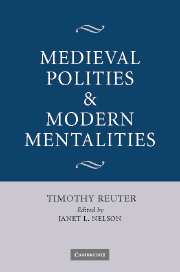Book contents
- Frontmatter
- Contents
- Editor's note
- Acknowledgements
- List of abbreviations
- Editor's introduction
- PART I MODERN MENTALITIES: HISTORIOGRAPHIES, METHODOLOGIES, PRECONCEPTIONS
- PART II THE SYMBOLIC LANGUAGE OF MEDIEVAL POLITICAL ACTION
- 7 Nobles and others: the social and cultural expression of power relations in the Middle Ages
- 8 Regemque, quem in Francia pene perdidit, in patria magnifice recepit: Ottonian ruler representation in synchronic and diachronic comparison
- 9 Contextualising Canossa: excommunication, penance, surrender, reconciliation
- 10 Velle sibi fieri in forma hac: symbolic acts in the Becket dispute
- PART III POLITICAL STRUCTURES AND INTENTIONS
- Index
10 - Velle sibi fieri in forma hac: symbolic acts in the Becket dispute
Published online by Cambridge University Press: 12 August 2009
- Frontmatter
- Contents
- Editor's note
- Acknowledgements
- List of abbreviations
- Editor's introduction
- PART I MODERN MENTALITIES: HISTORIOGRAPHIES, METHODOLOGIES, PRECONCEPTIONS
- PART II THE SYMBOLIC LANGUAGE OF MEDIEVAL POLITICAL ACTION
- 7 Nobles and others: the social and cultural expression of power relations in the Middle Ages
- 8 Regemque, quem in Francia pene perdidit, in patria magnifice recepit: Ottonian ruler representation in synchronic and diachronic comparison
- 9 Contextualising Canossa: excommunication, penance, surrender, reconciliation
- 10 Velle sibi fieri in forma hac: symbolic acts in the Becket dispute
- PART III POLITICAL STRUCTURES AND INTENTIONS
- Index
Summary
In this paper, I consider medieval politics as a game. Various more or less suitable metaphors could be used here. Chess may seem particularly apposite, bearing in mind its strict rules, and its repertoire of generally recognised moves: openings, combinations and endgames. The Becket dispute can also be thought of as theatre. But if I stress here the theatrical element in the history of the dispute, that means something quite different from what, since Tennyson's time, has been the hallmark of the way these events have been represented in stage-plays. For Tennyson, Eliot, Anouilh and Fry, the conflict was first and foremost a moral one: either it was about differing conceptions of law and public interest (thus, Tennyson and Fry), or, in the age of totalitarianism, it was about the rediscovery of absolute moral principles by an individual who had spent long years in the service of a state presenting itself as the embodiment of the highest values, hence fundamentally immoral (thus, Eliot, who depicted political compromise as making a pact with evil, and also, up to a point, Anouilh). The film directed by Peter Glenville, and often shown on German television, was loosely based on Anouilh's play, but in fact veered between those two representations. All these creative works were concerned with exploring, exposing, understanding, by means of drama, the real or apparent contradictions in the ‘character’ of Becket.
- Type
- Chapter
- Information
- Medieval Polities and Modern Mentalities , pp. 167 - 190Publisher: Cambridge University PressPrint publication year: 2006
- 3
- Cited by



